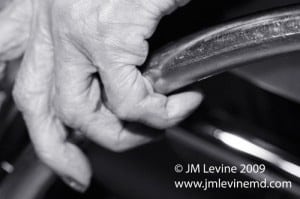 In 1981 I was an Internal Medicine intern rotating through a community hospital in New Jersey. My job was to carry out the day-to-day patient care under the direction of the private docs. I will never forget the first experience that showed me that geriatric patients are different, and helped me decide to pursue the specialty of geriatrics.
In 1981 I was an Internal Medicine intern rotating through a community hospital in New Jersey. My job was to carry out the day-to-day patient care under the direction of the private docs. I will never forget the first experience that showed me that geriatric patients are different, and helped me decide to pursue the specialty of geriatrics.
Sadie (not her real name) was a perky and independent 91 year old woman who lived with her elderly sister. During a routine office checkup, Dr. Blaster (not his real name either) found she had mild anemia and although she was asymptomatic he admitted her to my medical unit for transfusion and work-up.
While getting her second blood transfusion she began gasping for air. Sadie had developed congestive heart failure, presumably from fluid overload from the transfusion, and was transferred to intensive care and placed on a ventilator to breathe. She was started on digoxin and when she came off the ventilator she became toxic from this medication and developed cardiac arrhythmias. Then she became delirious and agitated and needed to be tied down to stop from pulling at intravenous lines.
Two weeks later Sadie lay in her bed exhausted and malnourished, bedsores on her buttocks, and thin from being underfed during her ordeal. She had a bladder catheter, was confused, and did not know where she was. Her sister sat at the bedside looking bewildered and overwhelmed. Sadie’s blood tests showed that she was still anemic.
Although I did my best carrying out the directions of Dr. Blaster, I sensed that something was not right. Did this elderly person need such aggressive medical treatment which caused a cascade of devastating side effects? Later I found out about the specialty of geriatrics, and pursued a fellowship under Dr. Robert Butler who was then chairman of the Geriatrics Department at Mount Sinai Medical Center in Manhattan.
The fact is that 91 year old people are physiologically not the same as 50 year old people. They react differently to medications and changes in the environment, and side effects of procedures can be devastating. In a frail elderly person, nutrition becomes a top priority that is often not considered. In retrospect, Sadie may have been better off being treated conservatively without this hospitalization and the therapeutics offered by Dr. Blaster.
Older Americans today have longer life expectancies than did prior generations, and many have chronic health conditions. As a group, the elderly consume a disproportionate amount of health care services, and are very susceptible to iatrogenic complications. For this reason all doctors need to be trained in basic principles of Geriatrics. Unfortunately this is something that many primary care physicians don’t know enough about, and patients can suffer as a result. The Hippocratic Oath sworn by physicians states “I will do no harm,” and part of its fulfillment is learning and applying principles of geriatric medicine.
* * * * * * * * * * * * * * *
Similar posts:
Recertification in Geriatric Medicine Completed.
Retooling for an Aging America: The Thud that Should Have Been a Bang.
How Will Health Care Reform Affect Geriatrics?
Aging and Invisibility
To view all posts on geriatric medicine click here.
